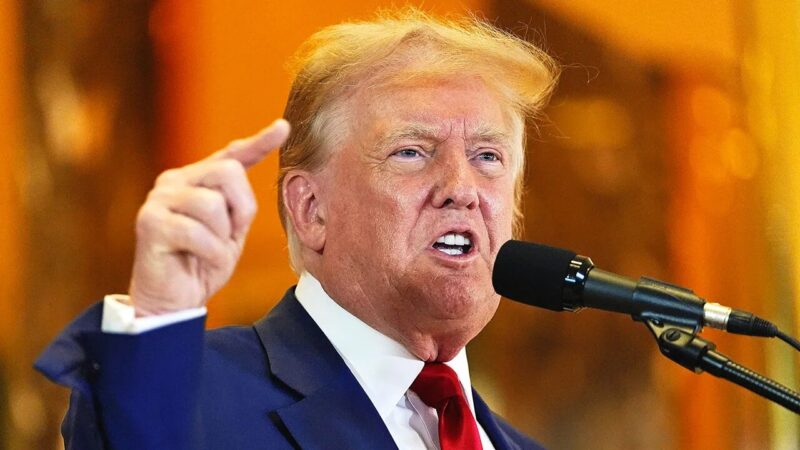Opinion
Who Will Tell Trump That The World Is One, And Not An Island?, by Isaac Asabor

Donald Trump has once again reignited his fiery rhetoric against immigrants, vowing to deport millions if he wins the 2024 U.S. presidential election. His obsession with a hardline stance against immigrants, who have, ironically, played pivotal roles in the growth of America, raises a critical question: Who will enlighten Trump that the world has become one global community?
During his first presidential campaign in 2016, Trump made it clear that one of his main goals was to curb illegal immigration and even reduce legal immigration. In speeches across the country, he pledged to “build a wall” along the U.S.-Mexico border, claiming Mexico would pay for it. He talked about deporting millions of undocumented immigrants, portraying them as criminals, rapists, and drug dealers. In his infamous launch speech on June 16, 2015, Trump said, “When Mexico sends its people; they are not sending their best… They are bringing drugs. They are bringing crime. They are rapists.
These divisive remarks became a cornerstone of his campaign and ignited a wave of support from those who shared his sentiments, but they also sparked fierce backlash from immigrant communities and human rights organizations. Trump continued with this narrative throughout his presidency, implementing harsh immigration policies like the controversial travel ban targeting Muslim-majority countries, separating children from their parents at the border, and ramping up Immigration and Customs Enforcement (ICE) raids.
Fast forward to 2024, and Trump’s rhetoric has not softened. Just yesterday, in a fiery campaign speech in Iowa, he once again threatened to deport millions of immigrants, promising to “clean up” America if re-elected. “We are going to take our country back, and we are going to deport every single illegal alien who is taking American jobs and draining our resources,” Trump declared to roaring applause. His words were chillingly familiar, reminiscent of the same fear-mongering tactics he used during his first run for the presidency.
But Trump’s obsession with deportation is not just limited to undocumented immigrants. During his presidency, he attacked legal immigration programs, too. He threatened to end the Diversity Visa Lottery, a program that has been a pathway to U.S. residency for thousands of people from underrepresented countries. Established in 1990, the Diversity Visa Lottery, also known as the Green Card Lottery, was designed to ensure that the U.S. remains a melting pot, welcoming immigrants from nations with historically low immigration rates to the United States. It is a program rooted in America’s core philosophy of being a nation built by immigrants, providing equal opportunity to people worldwide, regardless of their background.
For many, the Visa Lottery represents the American Dream: the idea that anyone, regardless of their origins, can come to the U.S. and succeed through hard work and perseverance. Trump’s attacks on this program expose a deeper discomfort with the idea of America as a diverse, global community. In a 2017 speech, Trump railed against the Diversity Visa Lottery, calling it “a disaster for our country” and falsely claiming that countries were sending their “worst people” to the U.S. He vowed to end the program, pushing instead for a “merit-based” immigration system that would favor wealthier, highly skilled immigrants.
But what Trump fails to recognize is that America’s greatness lies in its diversity. Immigrants from all walks of life, whether they arrive as refugees, lottery winners, or students, have contributed to the fabric of the country in immeasurable ways. The Visa Lottery has allowed individuals from disadvantaged nations to enter the U.S. and become entrepreneurs, teachers, engineers, doctors, and public servants. It has brought fresh perspectives, innovation, and a unique richness to American society.
The idea of deporting millions of immigrants or ending programs like the Visa Lottery is not only cruel but shortsighted. In an increasingly interconnected world, immigrants serve as vital links between nations, fostering collaboration and trade. Trump’s vision of America as an isolated fortress ignores the reality that global challenges, such as climate change, pandemics, and economic instability, cannot be solved by closing borders. The future demands cooperation, not division.
Moreover, Trump’s campaign promise to deport millions overlooks the devastating impact such policies would have on the U.S. economy. Immigrants, both documented and undocumented, play an essential role in industries like agriculture, healthcare, and technology. Deporting millions would create labor shortages, drive up prices, and destabilize entire sectors of the economy. For example, the agricultural industry, which heavily relies on immigrant labor, would be crippled without workers to harvest crops, leading to food supply issues and price hikes for consumers.
As the world becomes more interconnected, isolationism is not a sustainable strategy. The era of global communities where goods, ideas, and people flow across borders, is here to stay. Trump’s rhetoric may resonate with a segment of his base, but it is fundamentally out of step with the realities of the modern world. Countries thrive by embracing diversity, fostering innovation, and building bridges, not walls.
Given the foregoing facts, it is expedient to ask, who will tell Trump that deporting immigrants is not the solution? Who will tell him that by isolating America, that he is weakening it? The reason for telling him that deporting immigrants from America cannot be farfetched. This is as the very fabric of American society is built on the contributions of immigrants; people from every corner of the globe, who have come to the U.S. seeking a better life. If Trump truly wants to “Make America Great Again,” he should remember that America’s strength lies in its diversity.
In a world facing global challenges, climate change, economic uncertainty, and political instability, no nation can stand alone. The future belongs to those who can collaborate, innovate, and connect across borders. It is time for Trump to realize that the America of the 21st century is not an island, but a key player in a global community.























